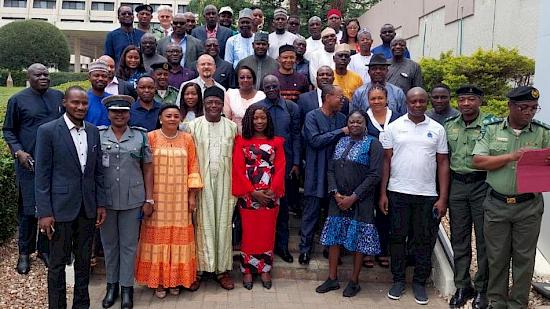Historic agreement between Nigeria and Cameroon to tackle wildlife crime
Environmental ministers from Nigeria and Cameroon have made conservation history by signing a highly-anticipated Memorandum of Understanding to address the illegal trade in wild species.
The agreement promises to tackle wildlife crime across the 2,000km shared border between the two countries. Tropical timber such as rosewood, elephant ivory, pangolin scales, and other wildlife commodities are among the typical high-value items that are poached and smuggled between countries.

The MoU, signed by Nigeria’s Environment Minister and Cameroon’s Minister for Forestry and Wildlife, will address wildlife poaching and illegal trade through a framework to jointly implement transboundary wildlife programmes, intelligence sharing protocols, and enhanced enforcement cooperation.
“This agreement marks a critical milestone for a nature-positive future”, said Richard Scobey, Executive Director of TRAFFIC.
TRAFFIC is proud to have supported development of this decisive process to crack down on crime and move towards legal and sustainable use of wild species that benefits both local communities and entire nations.”
Cameroon and Nigeria’s shared border has been routinely exploited by wildlife traffickers who target both local and migratory species. The UN Office on Drugs and Crime (UNODC), as well as extensive TRAFFIC investigations, have identified each country as both major sources and transit hubs for the global illegal trade in wild species.
The transboundary nature of wildlife crime and the social, developmental, and economic issues that drive it, require urgent cooperation between countries. Wildlife poaching, trafficking, and associated illegal activity has destabilising national repercussions, contributing to poverty, food and income instability, biodiversity collapse, and national revenue loss.
The agreement signed on Friday exemplifies an overall approach that is needed to counter such threats.
It marks a strong positive step in responding to the devastating environmental and human consequences of the illegal trade in wild species through a formalised management, conservation, sustainability, and enforcement framework.
TRAFFIC is pleased to have played a leading role in supporting Parties reach this agreement by providing extensive insights into domestic and international trade dynamics, technical advice into the development of the MoU itself, and funding support via local projects.
We congratulate both governments on this significant agreement and look forward to supporting subsequent efforts to preserve the rich biodiversity of both nations and support the sustainable and legal use of natural resources."
Denis Mahonghol, Director of TRAFFIC’s Central Africa office.





